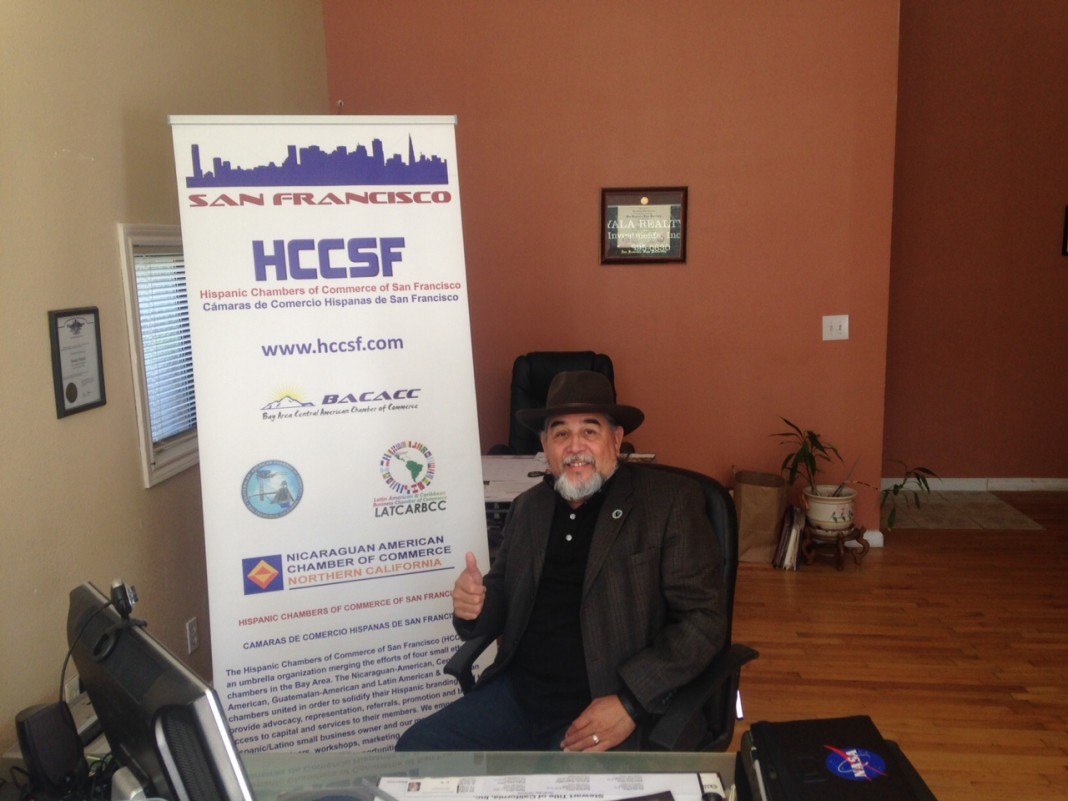Carlos Solórzano-Cuadra is the President and CEO of the Hispanic Chambers of Commerce of San Francisco (HCCSF). He is a charismatic leader who works tirelessly to promote unity, advocacy and business representation for all of the Hispanic/Latino small businesses in the San Francisco Bay Area. Kolau had the privilege of interviewing him in the HCCSF headquarters to discuss the challenges and opportunities that small businesses, especially those led by first-generation Hispanic immigrants, face today.
What is the profile of the Hispanic Chambers of Commerce of San Francisco members?
Seventy percent are first generation Hispanic-led businesses and 30% are non-Hispanics businesses. Most of them have less than 5 employees.
30% non-Hispanics?
Of course! Who wants to do business with the hottest market today? 1 out of 5 millennials are Latinos. They want to do business with them and get business with them. Our way of doing business is somewhat unique. We highly value referrals.
So, when a non-Hispanic business wants to do business with a Hispanic business, they usually do so by attending one of the networking events hosted by us, one of the business meetings we host, or conferences hosted by us. We do all of our events in both English and Spanish, which is an advantage because we make it easy for both parties to communicate and do business.
What is the main role of the Hispanic Chambers of Commerce of San Francisco?
Our goal is to help our members thrive, whether Hispanic or non-Hispanic. We do so by providing a wide array of educational services and networking events so that they can find new business opportunities and succeed at them.
HCCSF also has a political arm aimed at encouraging our members to participate actively in local political processes. We do not endorse any candidate, for any office, but we advocate for or reject bills in the San Francisco city hall as they benefit or harm the interests of our members. We are advocates for our members, regardless of their ethnic origin; we support both Hispanic and non-Hispanic businesses.
Additionally, we are also promoting the creation of the Chamber Foundation aimed at providing educational resources, and eventually scholarships, so our members can be better equipped to succeed.
Most of them target primarily fellow Hispanic first generation immigrants. How can they widen their target customer?
One of the opportunities we offer here in the Hispanic Chambers of Commerce of San Francisco is to provide them with the resources required to expand their target customer bases. They have to learn the language well, they also need to hire bilingual employees and keep up with the digital world. For instance, social network accounts for their businesses.
The business owners who count on the help of their children tend to do better in this regard. There is an added benefit for the second generation to be involved in the businesses of their parents, and that is to keep the roots and language. The Hispanic community is one of the most loyal. There are people who came 40 years ago and opened a bank account in a certain bank, and they still keep it open, even if they could get a better deal somewhere else.
Can these first generation Hispanic businesses reach out easily to non-Hispanics?
Most certainly, and they do. It is all about customer service. This is one of the issues we emphasize the most from the Hispanic Chambers of Commerce of San Francisco.
How do these Hispanic-led small businesses market themselves?
Most of them are led by first generation immigrants. Let me give you a common example that is true across the board among most first generation immigrants:
A husband and wife come to the United States and decide to open a restaurant because the wife cooks very well. The first six months, the place is full of customers. It is a new restaurant so people want to try it. The next six months, however, the restaurant is almost empty and ends up closing shortly thereafter. Why is that? Many times, there is neither a business plan, nor a marketing plan in place before starting the business. They don’t know what the best channel is to advertise the restaurant, nor did they know where the best location was.
People don’t just choose a restaurant when walking down the street. They find the restaurants online. They check out the reviews and make a decision accordingly. The percentage of people who go to a restaurant they pass when walking by is minimal. Not following the best practices to promote the restaurant online, and not making a business plan, means failure.
The takeaway here is that those first generation immigrant-led businesses who adapt to the digital reality will survive, but those who don’t adapt will not succeed.
The good news is that most are aware that they need to adapt to the digital reality, and are, in fact, adapting. From the Hispanic Chambers of Commerce of San Francisco, we work to raise awareness amongst those who don’t have an online presence, and to provide educational resources for those who are aware of the importance of a digital marketing strategy but struggle to implement it.
My motto is Siempre pa’lante which translates to always forward.
Give me your 2017 prediction. Will Hispanic, and other ethnic, small businesses gain market share vs their non-Hispanic businesses among 1st and 2nd generation immigrants?
Without any doubt. For example, a small Latino restaurant in the Mission not long ago, is now a corporation with several locations. Hispanic small businesses are adapting to the digital reality and are reaching a wider target customer base. These businesses have made noticeable progress, and this is due to the resiliency and determination of Hispanics, and all immigrants in general, to succeed.
The American dream for most first generation immigrants is not buying a house, but rather creating a successful business to support their families. Therefore, my prediction for the next two years is that they will continue to adapt to the digital technologies and grow at a higher pace than the other small businesses, thanks to their determination and the support provided by the chambers of commerce, like the Hispanic Chambers of Commerce of San Francisco.
—-
The Hispanic Chambers of Commerce of San Francisco (HCCSF) is emerging as a California’s premier business organization. This can be attributed largely to the representation of four small ethnic chambers based in San Francisco. Remaining independently as chambers, they united to form a new high caliber organization.
—
Kolau is the easiest way to market your small business. Request early access and start owning your small business online presence today. No marketing knowledge needed. No agencies required. Now you know, now you can.
Be sure to subscribe to our blog for more articles like this!





















